| |||||
| Decades: | |||||
|---|---|---|---|---|---|
| See also: | Other events of 1944 List of years in Albania | ||||
The following lists events that happened during 1944 in the People's Republic of Albania .
| |||||
| Decades: | |||||
|---|---|---|---|---|---|
| See also: | Other events of 1944 List of years in Albania | ||||
The following lists events that happened during 1944 in the People's Republic of Albania .
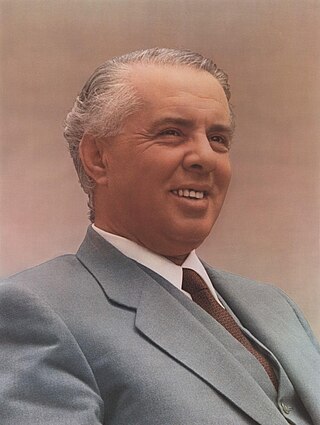
Enver Hoxha was an Albanian communist politician who was the ruler of Albania from 1944 until his death in 1985. He was the First Secretary of the Party of Labour of Albania from 1941 until his death, a member of its Politburo, chairman of the Democratic Front of Albania, and commander-in-chief of the Albanian People's Army. He was the twenty-second prime minister of Albania from 1944 to 1954 and at various times was both foreign minister and defence minister of the country.
The Enchele's polity was the earliest to emerge and centered in Albania. Also the earliest known Illyrian king, Bardylis, emerged in what is now Albania around 400 BC, aiming to make Illyria a regional power interfering with Macedon. He united many southern Illyrian tribes under his realm and defeated the Macedonians and Molossians several times, expanding his dominion over Upper Macedonia and Lynkestis. Before the Rise of Macedon Illyrians were the dominant power in the region. The kingdom of the Taulantii under Glaukias' rule was based in central Albania and dominated southern Illyrian affairs in the late 4th century BC, exerting great influence on the Epirote state through the close ties with the Molossian king Pyrrhus. Under the Ardiaei the greatest known Illyrian kingdom emerged in the 3rd century BC encompassing also northern Albania in its core territory. It became a formidable power both on land and sea by assembling a great army and fleet, and directly ruling over a large area made up of different Illyrian tribes and cities that stretched from the Neretva River in the north to the borders of Epirus in the south, while its influence extended throughout Epirus and down into Acarnania. The dominant power of the Illyrian kingdom in the region ceased after the Illyrian defeat in the Illyro-Roman Wars. The last known "King of the Illyrians" was Gentius, of the Labeatae tribe.
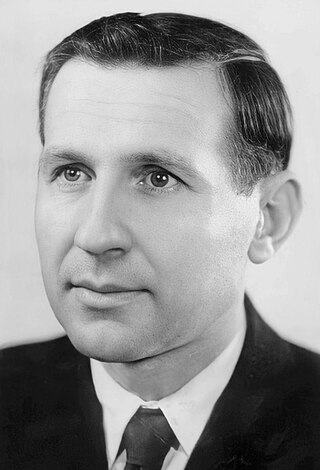
Mehmet Ismail Shehu was an Albanian communist politician who served as the Prime Minister of the People's Socialist Republic of Albania from 1954 to 1981. He was known as a close confidant of Enver Hoxha and served in various high-ranking positions in the government.

Skënder Gjinushi is an Albanian politician and academic. He has served in several high-ranking positions in the Albanian government, including as Speaker of Parliament and Deputy Prime Minister. He founded the Social Democratic Party of Albania and served as its chairman from 1991 to 2019. He is currently serving as the president of the Academy of Sciences of Albania.

Ilir Rexhep Meta is an Albanian politician. He served as the president of Albania from 24 July 2017 to 24 July 2022.
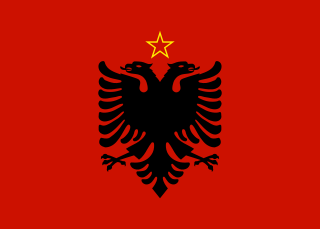
The People's Socialist Republic of Albania, officially the People's Republic of Albania from 1946 until 1976, and from 1991 to 1992 as the Republic of Albania, was the communist state in Albania from 1946 to 1991. It succeeded the Democratic Government of Albania (1944–1946).
The fall of communism in Albania, the last such event in Europe outside the Soviet Union, started in December 1990 with student demonstrations in the capital, Tirana, although protests started in January that year in other cities like Shkodra and Kavaja. The Central Committee of the communist Party of Labour of Albania allowed political pluralism on 11 December and the largest opposition party, the Democratic Party, was founded the next day. March 1991 elections left the Party of Labour in power, but a general strike and urban opposition led to the formation of a "stability government" that included non-communists. Albania's former communists were routed in elections in March 1992 amid economic collapse and social unrest, with the Democratic Party winning most seats and its party head, Sali Berisha, becoming president.

The National Liberation Movement, also translated as National Liberation Front, was an Albanian communist resistance organization that fought in World War II. It was created on 16 September 1942, in a conference held in Pezë, a village near Tirana, and was led by Enver Hoxha. Apart from the figures which had the majority in the General Council it also included known nationalists like Myslim Peza. In May 1944, the Albanian National Liberation Front was transformed into the government of Albania and its leaders became government members, and in August 1945, it was replaced by the Democratic Front.
Parliamentary elections for a Constituent Assembly were held in Albania on 2 December 1945. Voters were presented with a single list from the Democratic Front, organized and led by the Communist Party of Albania. The Front won all 82 seats.

The Democratic Government of Albania also known as the Hoxha I Government was established on 20 October 1944 by the National Liberation Movement, as the Albanian partisan resistance of 1940–1944 came to a close. A provisional government took power after the liberation of the country from German forces on 28 November. Its interim Prime Minister was Secretary-General Enver Hoxha of the Communist Party of Albania. The interim government was to be in existence until the holding of elections and the convening of a Constituent Assembly.
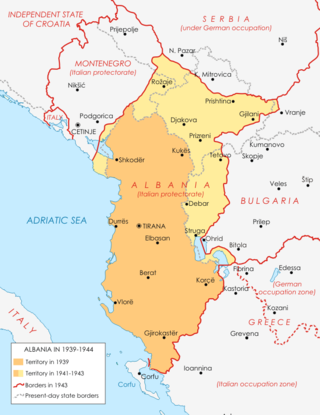
Liberation Day in Albania is commemorated as the day, November 29, 1944, in which the country was liberated from Nazi Germany forces by the Albanian resistance during World War II.

Spiro Koleka was an important Albanian statesman, communist politician and a high-ranking military officer during World War II. He was a civil engineer by profession. Spiro Koleka served as a parliament member in all legislatures from 1944 until 1990. Koleka was a member of the Politburo of the Party of Labor of Albania during the years 1948 to 1981. As part of his political career he also served as Chairman of the State Planning Commission, Minister of Industry and Construction of Albania, as well as Vice Prime Minister.
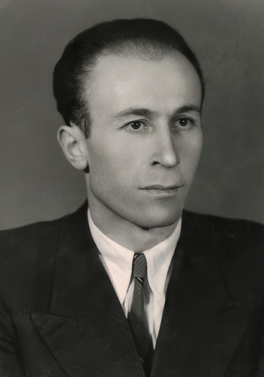
Koço Theodhosi was an Albanian politician of the Albanian Party of Labour (PPSh).
Ramadan Çitaku (1914-1990) was an Albanian politician of the Party of Labour of Albania. A native of Kosovo, he was one of the founding members of the Albanian Communist Party, member of the General Council of the National Liberation Movement during World War II, Minister of Finance of Albania, and diplomat.
Pirro Dodbiba (1925–2004) was an Albanian politician of the Albanian Party of Labour (PPSh). Although the nephew of Sokrat Dodbiba, former Minister of Finance in the quisling government of Rexhep Mitrovica during World War II who died in communist prisons, he chose from the beginning the opposite path joining the National Liberation Movement. He served as Party's representative in various places in Communist Albania, and by early 1970s became candidate-member for the Politburo of the Party of Labour of Albania, the highest political ruling entity of that time.
The following lists events that happened during 1945 in the People's Republic of Albania.
The following lists events that happened during 2002 in Republic of Albania.
The following lists events that happened during 2001 in Republic of Albania.
The following lists events that happened during 1998 in Republic of Albania.